
English (963)
Children categories
From learning to earning: Apprenticeships for youth employment

16 September 2013, Dhaka. Informal apprenticeship is an effective way towards youth employment and empowerment as noted by speakers at a certificate awarding ceremony in the capital’s BRAC Centre today at 11am jointly organised by BRAC and ILO.
Apprenticeship based skill training programme is a potential way for the youth to contribute significantly to the development process of Bangladesh. The formal certification will provide social recognition besides creating sufficient job opportunities for these trained youth both in formal and informal sector.
Special Guest of the ceremony Md. Mozibur Rahman, Joint Secretary of Ministry of Primary & Mass Education and Project Director of BEHTRUWC, says “Of the 1,000 trained young learners, 992 have successfully completed the course and 982 are now employed in nine different trades earning anywhere between Tk. 10,000-15,000 per month. Some of them are entrepreneurs and this is indeed a very encouraging prospect for our country aiming to become a middle income nation soon”.
Arthur Shears, Chief Technical Advisor, ILO Bangladesh TVET Reform Project said of the partnership, “We have proved that apprenticeships work in Bangladesh. Now the challenge is to scale this success up; we want to see one crore of the country’s young people skilled and employed. The ILO believes in decent work for all, and quality skills development programmes are essential in creating more decent work opportunities.”
Safiqul Islam, Director of BRAC Education Programme, is hopeful that “since BRAC is known for scaling up its projects, we look forward to working towards achieving the one crore target soon. This is a multi stakeholder project and that provides a great opportunity to explore prospects of innovations in this sector”.
At the ceremony, BRAC in association with Bangladesh Manpower, Employment & Training (BMET), Bureau of Non Formal Education (BNFE) and ILO presented certificates to 100 young graduates who have successfully completed their six months long apprenticeship based skill training with BRAC and ILO’s Skill Training for Advancing Resources (STAR) project. These 100 trainees are among the 1,000 trainees who are direct beneficiaries of Bringing Education to Hard to Reach Urban Working Children (BETRUWC) and have received apprenticeship training in the informal sector for nine different trades.
Experts stress special TB control measures for urban poor
Experts stress special TB control measures for urban poor
12 September 2013, Dhaka. Medical experts, practitioners, healthcare providers and policymakers at a roundtable on Thursday said special measures to treat tuberculosis among slum dewellers in the cities.
Having said that TB patients need to follow a rigorous course of medicines for a certain time, they said patients living in the slums often find it difficult to complete the course as they often need to move away for livelihood or other cause.
The National TB Control Programme, The Daily Ittefaq and non-governmental organization BRAC organized the roundtable on ‘Government and non-governmental involvement in TB control and care: Bangladesh context’ at the BRAC Centre.
Dr Mojibur Rahman, national programme consultant, National TB Control Programme, gave the key-note presentation at the event modertated by Shaheen Reza Noor, executive editor of Daily Ittefaq.
In his chief guest’s speech, Professor Dr Khondokar Md Shefyetullah, director-general of health, said in terms of the poor national budget allocation for the health sector the success is highly appreciable.
‘The success we have achieved in the health sector is a collaborative result of the government’s commitment, GO-NGO partnership and media involvement,’ the DG said.
He further said the government has 32 operational plans for health sector, one of which involves the mangement of tuberculosis and leprosy.
Dr Md Ashaque Husain, line director, TB and Leprosy, National TB Control Programme, Muzaffar Hossain Paltu, senior vice-president, National Anti-Tuberculosis Association of Bangladesh, M Hamid, director-general of BTV, attended the programme as special guests.
Md Nuruzzaman Haque, National TB Control Programme, Ashish Ghosh Saikat, managing editor, Ittefaq also attended the roundtable. Dr Md Akramul Islam, associate directior, Health Nutrition and Population Programme of BRAC, gave the welcome speech.
Dr Md Ashaque Husain said TB management will soon be included in the national undergraduate medical curriculum.
Dr Md Delwar Hossain, associate professor of BIRDEM, said around 10 patients among each 100 diabetic patients are being detected with TB infection.
Experts also stressed strengthening of GO-NGO partnership in tuberculosis management in the country.
According to the National Tuberculosis Control Programme, in 2011 a total of 1,55,564 people were detected with TB.
Bangladesh achieves MDG target for malaria before time
09 September 2013, Dhaka. Bangladesh has achieved its target for reducing deaths from malaria much ahead of time, experts said at a roundtable on Sunday.
They said the country by 2012 has successfully reduced deaths from malaria by 60 per cent, a target it had originally set to achieve by 2015.
Well-coordinated efforts of the government, NGOs and the media helped the country achieve the success, the speakers said.
The National Malaria Control Programme, Directorate General of Health Services, daily Samakal and non-government organization BRAC organized the event titled ‘National Malaria Control Programme: Present situation and future work plan’ at the BRAC Centre in Dhaka.
Health experts at the programme said currently more than 1.5 crore people of 13 districts in the country are in the risk of being infected by malaria.
According to 2012 statistics, 29518 patients were affected with the disease of whom 11 died. Of the districts in risk, Cox's Bazar and three hill districts, Khagrachhari, Rangamati and Bandarban are most affected.
Speakers pointed out that want of trained doctors and nurses in the Chittagong Hill Tracts is a major challenge in fighting the disease.
Chief guest of the programme, MM Neazuddin, health and family welfare secretary, criticized the tendency among many doctors to stay in the cities.
The problem is not only of the hilly districts, but of all over Bangladesh, he said, adding, 'I get so many requests for transfer that sometimes I switch off my cell phone'.
Mostafiz Safi, executive editor, Samakal, presided over the programme with Professor Dr Khondhaker Md Shefyetallah, director general of health service, and Professor Dr MA Faiz, former director general of health service, present as special guests.
The keynote presentation was given by Professor Dr Be-Nazir Ahmed, director (disease control) and line director (CDC), health service, ministry of health and family welfare. Abdullah Shahriar, assistant professor, National Heart Institute and Hospital, also editor of health page of Samakal, moderated the roundtable.
Dr Md Akramul Islam, associate director of BRAC Health Nutrition and Population Programme, also spoke.
BRAC forms national alliance to eradicate child marriage
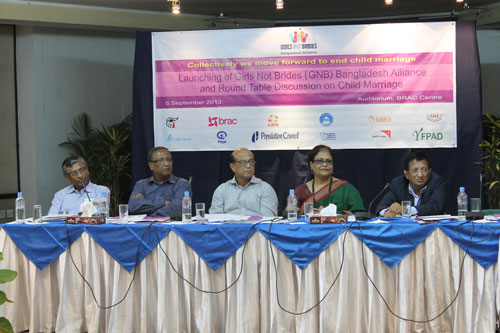
07 September 2013, Dhaka. A new alliance has been formed with the hope to end child marriage in Bangladesh. The Girls Not Brides Bangladesh Alliance was formally launched today at BRAC Centre with its first national round table discussion. The 13-member alliance, led by BRAC, includes prominent organisations such as BLAST, CARE Bangladesh, Family Planning Association of Bangladesh, icddr,b, Marie Stops Bangladesh, National Girl Child Advocacy Forum, Plan Bangladesh, Population Council, White Ribbon Campaign, World Vision, and Youth Forum Promoting Access to Development.
Girls Not Brides: the Global Partnership to End Child Marriage is an international network of many development organisations working to end child marriage. At present, there are 286 members in 53 countries in the network. Concerned about the often dangerous effects of child marriage, organisations in Bangladesh decided to strengthen the international network by forming the Girls Not Brides Bangladesh Alliance.
BRAC’s Vice chairperson Ahmed Mustaqur Raza Chowdhury stated during the launching ceremony that child marriage is one of the biggest social problems in Bangladesh, and a major violation of human rights for both young girls and boys. Mr, Mustaq also commented that without everyone within a society being aware of the harmful implications of child marriage it will not be possible to bring an end to the practice. He invited all to join the movement in establishing a society free from child marriage.
Sheepa Hafiza, director of BRAC’s gender justice and diversity division and migration division, expressed in her speech that the working area of this initiative would be more widened in the near future.
Sultana Kamal, former advisor of the caretaker government of Bangladesh and executive director of Ain O Shalish Kendra said, “If we work to abolish child marriage one village at a time, it is possible to eradicate it completely from our society.”
Ayesha Khanam, chairperson of Bangladesh Mahila Parishad said, “Poverty, illiteracy and social insecurity are the factors behind child marriage. We have to build strong resistance against them.”
Information commissioner Sadeka Halim said,“It is not a matter of discussion for a day. We must focus on it for all the 365 days of the year.”
The launching ceremony was attended by some of the most renowned people in the country including Salma Khan, former chairperson of Beijing Platform for Action and former divisional head of Planning Commission; Dr Nurunnabi, vice chancellor of Begum Rokeya University; Kazi Riazul Haque, permanent member of Bangladesh Human Rights Commission; Taptun Nasrin, AIG, Crime Metro, Police Headquarters Dhaka; Fowzia Khandoker Eva, consultant, Police Reform Project, UNDP; Farzana Rupa, journalist, Channel 71; Hannana Begum, director, Bangladesh Bank; Nazia Haider, Swedish Development Cooperative; Mushfiqua Z Satiar, advisor, SRHR and Gender, The Embassy of the Kingdom of the Netherlands; Anil Tambey, country director, Marie Stopes and Chandan J Gomez, director of World Vision Bangladesh Advocacy.
Grassroots experiences on child marriage were also shared during the event from Sajeda Begum, union parishad member, Pirujali Union, WARD no 09; Md Ijjat Ali, union parishad member, Pirujali Union, WARD no 07; Kazi Md Nurul Islam, Gazipur Sadar.
Experts call for urgent Action to address Malnutrition
05 September 2013, Dhaka. Nutrition experts, healthcare providers and others concerned at a discussion on Wednesday stressed urgent action to address the country's current malnutrition situation.
BRAC, a non-government organization, arranged the event at BRAC Centre, chaired by Sir Fazle Hasan Abed, its founding chairperson.
At the discussion titled 'Scaling up nutrition: An urgent call for commitment and multi-sectoral action', Sir Fazle said a combined approach is essential to address the issue. A strong focus on nutrition education and promotion by the highest government authority of the movement called Scaling Up Nutrition, SUN in short, should be integral part of the combined approach, he added.
'BRAC has been working in the nutrition sector for many years. However, the progress Bangladesh has so far made is not enough,' he remarked.
Kaosar Afsana, director of BRAC Health, Nutrition and Population Programme , gave the welcome speech at the discussion also addressed, among others, by Dr Tahmeed Ahmed, director of Centre for Nutrition and Food Security, ICCDR,B, Sarah Cook, head of DFID, Dr Rukhsana Haider, chairperson of Civil Society Alliance for SUN, Nasima Begum, additional secretary of the government social welfare department. Representatives from UNICEF, WHO, FAO, EU and World Bank were also present.
'We cannot accept that 53,000 children die each year from preventable complications resulting from chronic malnutrition,' said Dr Kaosar Afsana. She also emphasized cost-effective interventions to address the issue.
Dr Rukhsana Haider called for including nutrition components in development interventions in the country.
The speakers also viewed that knowledge sharing, collaboration and multi-ministry-based approach can highly contribute to addressing the issue.
600 Women drivers to be trained by BRAC
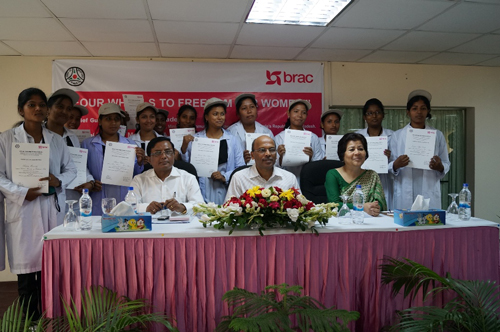
01 September 2013, Dhaka. BRAC, in collaboration with Bangladesh Road Transport Authority (BRTA), arranged an event named “Four Wheels to Freedom for Women” to discuss the issues relating to the employment opportunities of its woman drivers coming out of the BRAC Driving School. The event was also organised to mark the certificate giving ceremony of 15 freshly graduated women drivers from the school. The event took place at Uttara BRAC Learning Centre, in Dhaka.
BRAC Driving School, a part of BRAC’s Road Safety programme, started out in May 2012 as an institution to create trained drivers and qualified trainers for the roads of the country. In September 2012, BRAC Driving School, in partnership with BRTA, started the project- “Women Steering Forward” to create 600 trained women drivers. 75 of them have completed their training but only 18 of them have been employed so far.
Among the special guests of the event were, Ms. Rokiya A. Rahman, adviser to the former caretaker government and member of the BRAC Governing Body and Mr. Md. Nazrul Islam, Chairman, BRTA. The event was chaired by Mr. S N Kairy, Chief Financial Officer, BRAC & BRAC International.
The event started with a presentation by the Director of BRAC’s Road Safety programme, Mr. A. Najmul Hussain. He mentioned that, we have a severe shortage of skilled and properly trained drivers in our country; maintaining the quality of training in driving schools is also a very important issue. He was of the opinion that if a portion of the car registration fees can be spent in training the drivers then everyone would benefit from it.
One of the special guests, Ms. Rokiya A Rahman shared few of her experiences of driving in the streets among men. She stated that, “Women are not to be held back, the event today is a proof of that.”
Mr. Md. Nazrul Islam noted that, 15 percent of the driving jobs in the government pool are reserved for women drivers; but they (BRTA) do not receive any applications from the women drivers.
The Chair of the event, Mr. S N Kairy, said that BRAC is spending approximately 80,000 BDT for each of these graduates but they should have ample opportunities of employment after they graduate. He called the corporate sector for action in this matter by employing women drivers in their organisations. He also mentioned that, there are plans to send these drivers abroad for employment when the time is right.
All 15 of the women drivers who graduated from the 4th batch of BRAC Driving School received certificates from the special guests of the event.
A New Vision for seven million people in 10 City Corporations
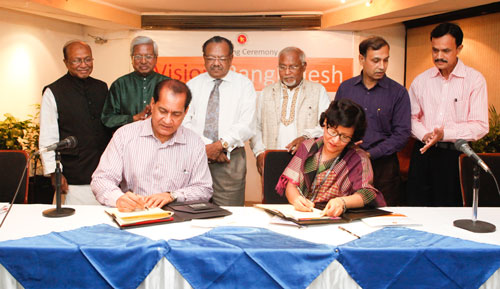
04 August 2013, Dhaka. BRAC and National Eye Care- Directorate General of Health Services (NEC-DGHS), Ministry of Health and Family Welfare have launched the second phase of the eye care project- Vision Bangladesh. The launching ceremony was held on the 4th August, 2013 at BRAC Centre auditorium.
In two and a half years of Vision Bangladesh Phase-I, about 95 per cent of the target of 100,000 cataract surgeries and 200,000 refractive error corrections have been achieved. Moreover, with the aid of frontline community health workers, BRAC has been able to deliver eye care at the doorstep of one million people across Sylhet division.
Based on the enormous success of that partnership and lessons learned in operating in rural areas, BRAC is now going to expand the eye care services in the slums of 10 city corporations of Bangladesh, covering an estimated 7.25 million people.
This project, which will run from July 2013 to December 2015, is aligned with Bangladesh Government’s national goal of eliminating avoidable blindness from Bangladesh by 2020.It will be implemented through a partnership approach and will foster collaboration between BRAC, NEC-DGHS, and other partner organizations including NGOs and hospitals. This project will develop capacity of the eye care providers and institutions; deliver eye care services and establish and sustain referral networks between the slum community and functional government hospital/private/NGO facilities for eye care.
Prof. Dr. A.F.M Ruhal Haque MP, Honourable Minister, Ministry of Health & Family Welfare (MoHFW), attended the ceremony as the Chief Guest. Prof. Syed Modasser Ali, Advisor to the Honourable Prime Minister for Health and Family Welfare and Dr. Capt. (Rtd.) Mozibur Rahman Fakir MP, Honourable State Minister, MoHFW, attended as Special Guests. The event was chaired by Sir Fazle Hasan Abed, Founder and Chairperson, BRAC.
The Minister said, “The effective leadership in National Eye Care and BRAC’s widespread network of frontline community health workers would equate to the certain success of this project.”
Prof. Syed Modasser Ali pointed out that the immense success of Sir Fazle in implementing a diverse range of development projects is the indicator that this project will also be a success.
Sir Fazle Hasan Abed said, “BRAC and Ministry of Health and Family Welfare have been involved in a number of partnerships for a long time to provide a range of healthcare services, including eye care.” He emphasised on scaling up Vision Bangladesh project across the country to eliminate cataract backlog by 2020.
A memorandum of understanding was signed by Dr. Prof. Deen Md. Nurul Huq, Line Director, National Eye Care and Director cum Professor NIO&H and Dr. Kaosar Afsana, Director, Health Nutrition and Population Programme, BRAC.
BRAC University offers fully-funded residential diploma on midwifery programme
BRAC University is offering Diploma in Midwifery in collaboration with implementing partner organisations in respective areas of Dhaka, Dinajpur, Cox's Bazar, Khulna, Mymensingh and Sylhet. The Diploma in Midwifery Programme is a 155-credit, full-time, 36-month residential programme taught by experienced faculties trained by Jhpiego and Liverpool School of Tropical Medicine and OGSB.
BRAC University is admitting students to its three year residential Diploma in Midwifery programme with generous scholarships. Interested students may apply online via bracu.ac.bd/apply or call 880 172620726 for further information. Deadline for application is August 18, 2013.
Millions of mouths to feed? He did it.
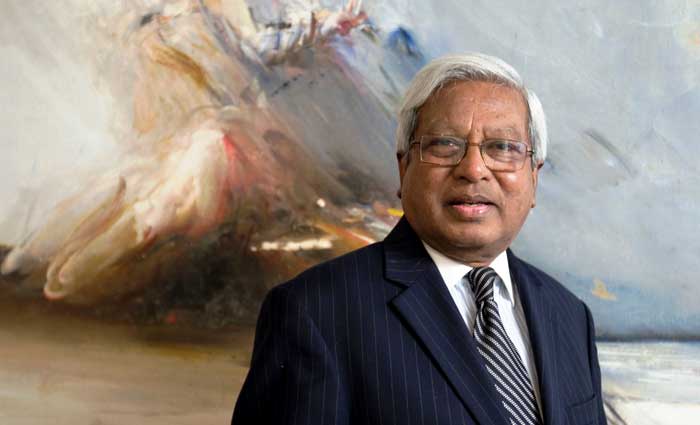
Bangladeshi poverty fighter Fazle Abed is the winner of the 2015 World Food Prize. (Courtesy photo)
Sometimes called the “Nobel Prize for food and agriculture,” the World Food Prize recognizes people who have made breakthrough contributions towards improving the world’s food supply. This year’s winner is a former accountant from Bangladesh.
Sir Fazle Hasan Abed, knighted for his work by the British crown, founded BRAC (formerly known as Bangladesh Rural Advancement Committee) in 1972 following Bangladesh’s devastating cyclone and war of independence. More than 40 years later, BRAC has helped nearly 150 million people out of poverty.
Focus on women and children
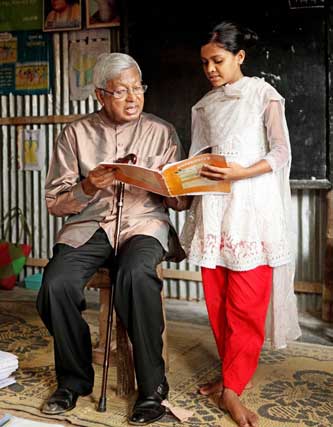
Beyond supporting a range of businesses, including fish hatcheries, tea plantations and milk processing centers, Abed has made it his business to help women in rural villages. They learn modern farming techniques, such as how to efficiently apply fertilizer to crops. Abed established programs that have enabled millions to disburse more than $1 billion through microfinance organizations. The loans have allowed women to create small, sustainable businesses producing iodized salt or raising cows, along with dairy and poultry farming.
BRAC’s innovations helped cut Bangladesh’s child mortality rate from 25 percent to 7 percent. How? Abed trained women to teach others how to mix a solution of water, salt and sugar — a combination that prevents dehydration. Instructors’ wages were based on how well households understood this lesson, in essence making this effort one of the world’s earliest incentive-based social entrepreneurship programs.
“Only by putting the poorest, and women in particular, in charge of their own destinies, will absolute poverty and deprivation be removed from the face of the earth,” Abed said after he learned of his nomination for the award.
Take Christina John, a farmer in Dodoma district in Tanzania. As a result of the vegetable seeds and field management lessons she received from BRAC, which began operations in the large East African nation in 2006, her income increased fourfold. She now earns enough money to send her children to school.
Feeding millions
Today, BRAC operates in Bangladesh and 10 other countries in Asia, Africa and the Caribbean, reaching an estimated 135 million people.
“At a time when the world confronts the great challenge of feeding over 9 billion people,” said World Food Prize President Kenneth Quinn, Abed and BRAC “have created the pre-eminent model being followed around the globe on how to educate girls, empower women and lift whole generations out of poverty.”
U.S. Agriculture Secretary Tom Vilsack said that “Sir Fazle’s and his organization’s recognition that engaging women in STEAM fields — science, technology, engineering, agriculture and math — benefits our local and global communities.”
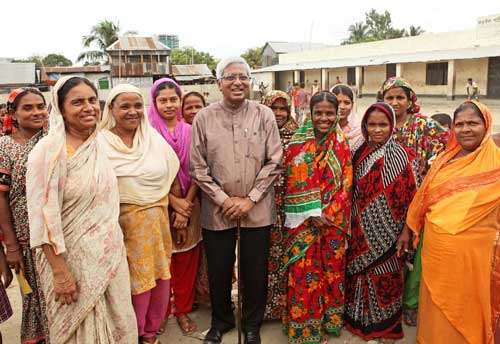
The roots of the World Food Prize
The World Food Prize was conceived in 1986 by Nobel Peace Prize recipient Norman Borlaug, an agronomist who grew up on a farm in Iowa. The father of the Green Revolution in the 1960s and 1970s, he crossbred thousands of wheat varieties, created “dwarf wheat” and developed a new agriculture technique that saved hundreds of millions of people from death and famine.
Recipients of the award have hailed from all over the world, including India, China, Cuba, Denmark, Sierra Leone, Brazil and Ethiopia, where Gebisa Ejeta brought drought-resistant sorghum to Africa. U.S. winners include food scientist Philip Nelson, who revolutionized bulk food transportation and storage.
Abed will receive the World Food Prize on October 15 in Des Moines, Iowa, during the Borlaug Dialogue, a three-day international symposium that attracts agriculture and development experts from more than 65 countries.
#GirlHero: The Story of Basemera From Uganda
A girl from Uganda has made it her mission to help other girls realise their potential
As world leaders shepherd in a new era of international development with the UN's Global Goals, Basemera, a young girl in rural Uganda dreams about her future and that of her friends and family.
Basemera comes from a Catholic family and is one of seven children. Her father is a primary school teacher and tried to earn enough to keep his kids in education, but didn't succeed; Basemera had to drop out of secondary school after only four years.
Yet she dreams big. Despite her challenging circumstances, she wants to start a business, so she can ensure that the next generation is fed and educated. She knows first-hand that food and schooling aren't a given for girls. And she is determined to change things.
Life-changing moment
Basemera is a leader, a dreamer, a change maker. But that wasn't always the case. Once, she was resigned to living in the kitchen and worrying about her prospects and those of her brothers and sisters with no solutions, no course of action. Life was bleak, the future uninspiring.
Then Basemera met Rosemary Akello. Rosemary works for BRAC, an organisation dedicated to bringing financial inclusion and economic empowerment to vulnerable populations. In her words, "It's important to invest in girls, because even if men build houses, women will always build homes."
That's why Rosemary runs financial inclusion and economic empowerment programmes, such as Goal, across 156 villages in Uganda, She knows firsthand that financial inclusion will ensure girls stay in school, keep them from early and forced marriages, and grant them the opportunity to determine their own future.
Feeling empowered
Basemera joined the Goal programme and her world opened up. She learned about her human rights; she learned about her body; she learned about effective communication, and she learned that she matters. Perhaps most importantly, she learned that she had options. She could be financially independent if she had the right tools, capabilities and resources.
Rosemary taught Basemera how to budget, save and plan her family finances. Basemera became financially literate - a critical milestone to achieving financial inclusion. And because BRAC is a microfinance institution that provides microloans to poor and vulnerable individuals, Basemera learned about entrepreneurship. She discovered that she could start her own business and control her economic destiny. That was the game changer.
Empowering others
Now, Basemera is not only dreaming about her future business, but also mentoring and coaching other girls in her community. She is encouraging them to make informed personal and financial decisions; she is pushing them to pursue their ambitions; she is ushering in the new generation of girl entrepreneurs across Uganda.
Basemera wants every girl to have a goal, as well as the right tools to achieve them, such as financial education and access to finance. As the Global Goals are celebrated around the world this week, let's remember Rosemary and Basemera in Uganda. They prove that if we invest in girls and women, we will change the world.
Join the world’s biggest family




